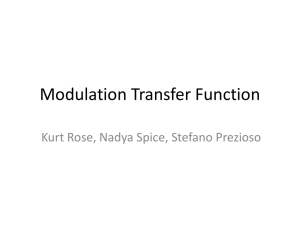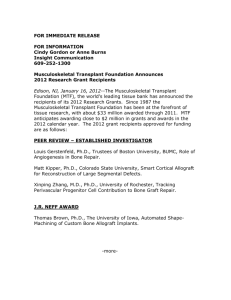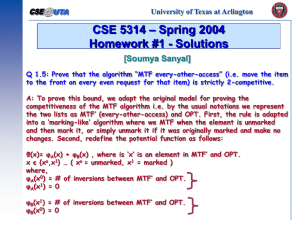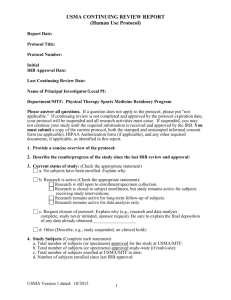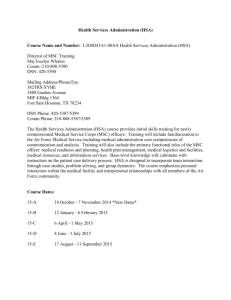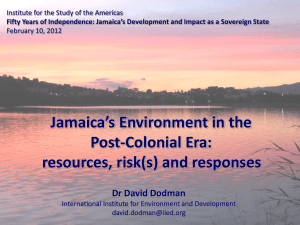M&E for Program Management & Improvement (M&E 101) Training
advertisement
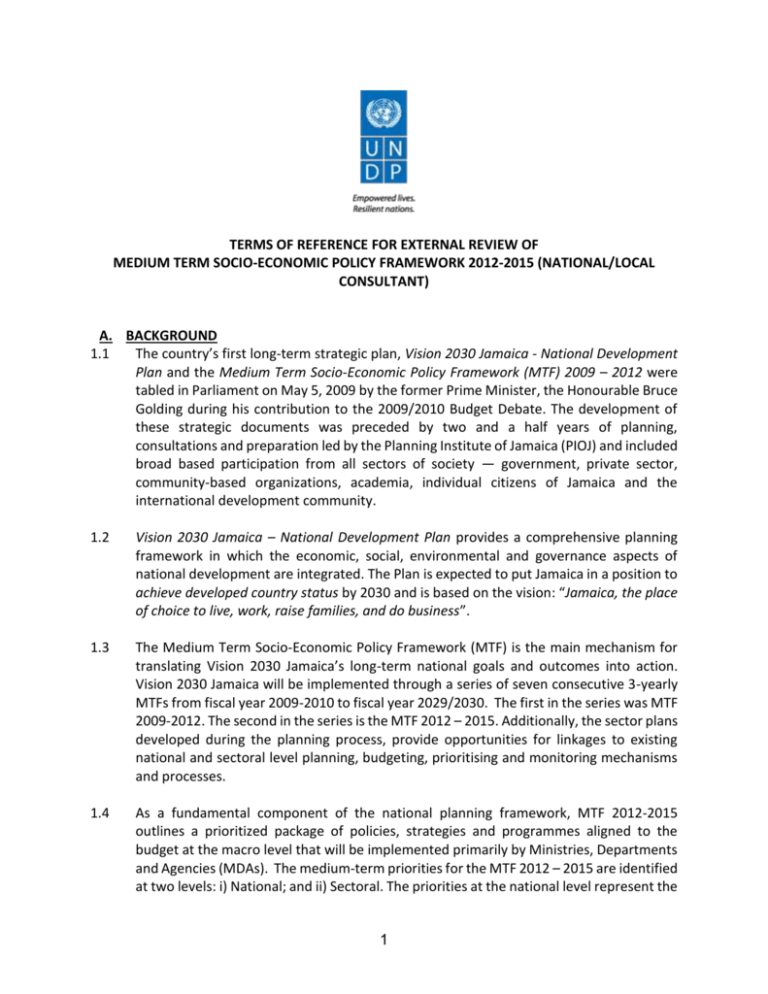
TERMS OF REFERENCE FOR EXTERNAL REVIEW OF MEDIUM TERM SOCIO-ECONOMIC POLICY FRAMEWORK 2012-2015 (NATIONAL/LOCAL CONSULTANT) A. BACKGROUND 1.1 The country’s first long-term strategic plan, Vision 2030 Jamaica - National Development Plan and the Medium Term Socio-Economic Policy Framework (MTF) 2009 – 2012 were tabled in Parliament on May 5, 2009 by the former Prime Minister, the Honourable Bruce Golding during his contribution to the 2009/2010 Budget Debate. The development of these strategic documents was preceded by two and a half years of planning, consultations and preparation led by the Planning Institute of Jamaica (PIOJ) and included broad based participation from all sectors of society — government, private sector, community-based organizations, academia, individual citizens of Jamaica and the international development community. 1.2 Vision 2030 Jamaica – National Development Plan provides a comprehensive planning framework in which the economic, social, environmental and governance aspects of national development are integrated. The Plan is expected to put Jamaica in a position to achieve developed country status by 2030 and is based on the vision: “Jamaica, the place of choice to live, work, raise families, and do business”. 1.3 The Medium Term Socio-Economic Policy Framework (MTF) is the main mechanism for translating Vision 2030 Jamaica’s long-term national goals and outcomes into action. Vision 2030 Jamaica will be implemented through a series of seven consecutive 3-yearly MTFs from fiscal year 2009-2010 to fiscal year 2029/2030. The first in the series was MTF 2009-2012. The second in the series is the MTF 2012 – 2015. Additionally, the sector plans developed during the planning process, provide opportunities for linkages to existing national and sectoral level planning, budgeting, prioritising and monitoring mechanisms and processes. 1.4 As a fundamental component of the national planning framework, MTF 2012-2015 outlines a prioritized package of policies, strategies and programmes aligned to the budget at the macro level that will be implemented primarily by Ministries, Departments and Agencies (MDAs). The medium-term priorities for the MTF 2012 – 2015 are identified at two levels: i) National; and ii) Sectoral. The priorities at the national level represent the 1 most important areas for the country to focus its efforts and resources over the medium term from 2012 to 2015, to address the greatest challenges to national development at this stage of implementation. The priorities at the sector level represent the most important strategies and actions to be implemented within each sector over the medium term, based on the key issues and challenges identified for each sector. The Medium Term Themes, priority national outcomes and priority areas of focus for the Medium Term Socio-Economic Policy Framework (MTF) 2012 – 2015 are set out below. National Goals National Goal # 1: Jamaicans Are Empowered To Achieve Their Fullest Potential Medium Term Theme Priority National Outcomes A Healthy and Stable Population Development and Protection of Human Capital World Class Education and Training Priority Areas Primary Health Care Health Promotion Approach Disease Surveillance and HIV/AIDS International Migration and Development Early Childhood Development Educational System Reforms Labour Force Training Effective Social Protection Social Welfare and Social Security Poverty Reduction Persons with Disabilities National Goal # 2: The Jamaican Society Is Secure, Cohesive and Just Security and Safety Anti-Crime Strategy National Security and Justice National Goal # 3: Jamaica’s Economy Is Prosperous Economic Stability, Competitiveness and Employment National Goal # 4: Jamaica Constabulary Force Reform Environmental Resilience and Community Renewal Programme Protection and Care for Children and Youth Effective Governance Justice System Reform A Stable Macroeconomy Fiscal Consolidation Debt Management Tax Reform An Enabling Business Environment Priority Economic Projects Competitive Business Environment Labour Market Reform Targeted Employment Programmes Major Development Projects: Road Infrastructure Development Agroparks ICT Parks Logistics Hub Tourism Product Development Creative Industries and Sport Urban Renewal LNG Project Hazard Risk Reduction Environmental Resilience and Sustainable Planning Hazard Risk Reduction and 2 Local Governance National Goals Jamaica Has a Healthy Natural Environment Medium Term Theme Priority National Outcomes Climate Change Response Adaptation to Climate Change Priority Areas Climate Change Adaptation and Mitigation 1.5 MTF 2012-2015 also presents the medium term development priorities, strategies and actions to be pursued under each of the 15 national outcomes under Vision 2030 Jamaica, including the nine (9) goods- and services-producing industries under National Outcome #12. It sets out the timeframe for implementation of the priority strategies and actions for each of the 15 national outcomes, as well as the main agencies and stakeholders responsible for implementation of each priority strategy and action. In addition, it presents the key national indicators and targets that will provide a quantitative framework for measuring the progress toward achievement of MTF 2012-2015 and the long-term goals and outcomes of Vision 2030 Jamaica. 1.6 Past planning exercises have been negatively impacted by factors including an inadequate monitoring and evaluation framework and the weak synergies between targets, indicators and the budget. A distinguishing feature of Vision 2030 Jamaica is its focus on implementation and accountability. To that end a monitoring and evaluation system based on a results-based management platform has been established. The Vision 2030 Jamaica Monitoring and Evaluation System calls for quarterly and annual monitoring of implementation progress and for periodic independent evaluations which will, inter alia, contribute to informed decision-making, foster an environment of learning by doing and promote greater accountability for performance. The M&E system foresees these processes as integral for introducing modifications and revalidation of the MTF as an effective mechanism to achieve Vision 2030 Jamaica goals and outcomes. 1.7 March 2015 marks the end of the three year cycle for MTF 2012-2015. A review of MTF 2012-2015 is timely to assess the performance of the MTF to date – both in terms of its policy relevance and effectiveness in light of rapidly changing local and global environment and emerging opportunities in Jamaica, and in terms of the quality and utility of the measures used to measure progress. This review will also generate lessons for informing the strategic prioritization process for Medium Term Socio-Economic Policy Framework (MTF) 2015 – 2018. 1.8 B. PURPOSE AND OBJECTIVES The primary purpose of this review is to assess the progress of the Medium Term SocioEconomic Policy Framework 2012-2015 during its period of implementation in effectively and sustainably contributing towards the achievement of the national vision, goals and outcomes as articulated in the Vision 2030 Jamaica – National Development Plan. 3 1.9 The specific objectives are as follows: a. Determine how effective the Medium Term Socio-Economic Policy Framework 20122015 has been as an instrument of prioritisation and accountability towards the achievement of the national goals and outcomes of Vision 2030 Jamaica – National Development Plan. b. Determine the extent to which the 3-year MTF is the appropriate vehicle to guide national planning and the implementation of prioritised programmes and activities towards the achievement of national goals and outcomes in the future. c. Identify lessons learnt from experiences, and issues and opportunities emerging from the implementation of the current MTF, and thereby inform the design and prioritization of the next MTF 2015-2018, through a participative and formative review process. 1.10 It is also expected that the review process will contribute to the strengthening of national evaluation capacity. C. SCOPE OF WORK AND KEY QUESTIONS 1.11 The consultant will seek to address the following: a. Assess the role and relevance of the MTF in relation to the issues and challenges identified by the various analyses undertaken in the preparation of the MTF and in the context of national policies and strategies: i. Did the MTF outcomes sufficiently address key issues, their underlying causes, and challenges identified? ii. Was the MTF results matrix flexible and relevant to respond to new issues and their causes as well as challenges that arose during the MTF cycle? iii. Have the MTF priority and supporting outcomes been relevant in terms of internationally agreed goals and commitments, such as the MDGs, human rights treaties (including the CEDAW, CRC, etc.) and other high priority international or regional commitments? b. Assess design and focus of the MTF, i.e. the quality of the formulation of results at different levels, i.e. the results chain: i. To what extent was the MTF designed as a results-oriented, coherent, and focused framework? ii. Were the selection criteria for priority and supporting outcomes justified? iii. Did the design of the MTF results framework allow for easy monitoring? iv. To what extent and in what ways has the MTF placed special emphasis on the promotion of gender equity, protection of vulnerable groups and social inclusion during its implementation? 4 c. To the extent possible, assess how efficiently inputs and resources were utilized to produce the results or outputs? i. Were inputs provided and outputs met on a timely basis? ii. Has the MTF contributed to a reduction of transaction costs for the government? iii. How efficiently has result based management been applied in achieving the MTF results? d. Assess the effectiveness of the MTF in terms of progress towards achievement of the National Goals and Outcomes of Vision 2030 Jamaica: i. How far the country has progressed against the national/sector strategies and key actions; indicators and associated targets in the MTF? ii. Were there any major changes in national indicators to which the implementation of MTF strategies contributed? iii. What were the primary factors and conditions that contributed to these results? iv. What were the key positive developments/changes that occurred during the implementation of key strategies and actions, and what will be the implications for them during the next MTF cycle? v. To what extent have the national/sector strategies and key actions; and indicators been utilized as a basis for performance monitoring, with lessons identified and internalized to improve performance? vi. What are the perceptions of the different stakeholders, especially the Government officials, implementing agencies, private sector, civil society, individuals, and international development partners (IDPs) about the overall impact of the MTF? e. Assess the effectiveness of the MTF as a coordination and partnership framework: i. How effective have the institutional arrangements for the coordination of implementation and monitoring and evaluation of Vision 2030 Jamaica been? ii. To what extent and in what ways have the institutional arrangements of the MTF contributed to achieving better synergies and joined-up approaches to national development? iii. How effective have the thematic working groups been as a basis for representing and coordinating the collective strategic interests of government, civil society and international development partners in achieving stated goals and outcomes? iv. To what extent has the MTF been used by MDAs, Civil Society, IDPs as a key mechanism for planning, budgeting, monitoring and evaluation and overall goal setting and prioritization? v. Has the MTF promoted effective partnerships and strategic alliances around the main MTF priority outcome areas (e.g. within Government, with civil society partners, the private sector, and IDPs? f. Analyse to what extent results achieved under the MTF are sustainable: i. Have coordination, collaborations and/or synergies fostered by the MTF contributed to greater sustainability of results of the programmes and activities by MDAs, IDPs, private sector, civil society, etc? 5 ii. iii. iv. v. vi. vii. viii. ix. To what extent were clear M&E mechanisms defined in the MTF? Were those mechanisms feasible given country capacity? Were provisions for capacity enhancement made? Was sufficient information generated to allow for effective M&E? How useful have the progress reports (quarterly reports and APRs) and M&E tools been in tracking implementation of the MTF? To what extent have progress reports been able to identify gaps in implementation? To what extent and in what ways has the MTF contributed to enhanced national capacities in results based management monitoring and evaluation in government, civil society? To what extent does the MTF promote ownership of strategies/programmes by the key stakeholders? g. Distil lessons learned and prepare practical and realistic recommendations, as appropriate on all of the above, and to draw conclusions on opportunities for greater progress towards achievement of the national goals and outcomes of Vision 2030 Jamaica. D. METHODOLOGY 1.12 The MTF review will apply, as far as possible, the following criteria which assess relevance, effectiveness, efficiency, and sustainability of results. 1.13 The consultant will develop a detailed methodological proposal as part of the Inception Report, which should take into consideration: a. Multiple methods and triangulation of information of both quantitative and qualitative nature. b. All findings, conclusions, recommendations and lessons should be based on verifiable and credible information and evidence, and should reflect the results chain or theory of change that underpins the MTF (i.e. links between goals, outcomes, outputs). c. Whenever possible and if available, maximize the use of disaggregated data by gender and other relevant groups. Ideally, this should be done not only by using the existing indicators, but also through the design of information collection methods (interview questionnaires, surveys, focus groups) that allow the extraction of disaggregated information of perceptions and opinions by gender and/or other groups.1 d. Design the methodology based on an actively participative and inclusive process with relevant actors and stakeholders during all phases of information collection and validation of results, so as to foster a process that is: geared towards accountability; 1 This should ideally be done only with a small sample of stakeholders when assessing particularly the criteria of relevance and effectiveness. 6 yields information produced through collective reflection and useful for decisionmaking; and, generates a ‘learning-though-the-process’ dynamic. 1.14 As a minimum, the review should include the following components: a. Undertake a comprehensive desk review of existing progress reports, studies/papers, newspaper reports related to the MTF/Vision 2030 Jamaica as well as other documents from the government on national policies and strategies. The available literature to be reviewed includes: Vision 2030 Jamaica – National Development Plan Medium Term Socio-Economic Policy Framework (MTF) 2009-2012 and 2012-2015 Vision 2030 Jamaica Progress Reports (2009/2010-2011/2012 and 2012/20132013/2014) Medium Term Socio-Economic Policy Framework Quarterly Reports A Growth Inducement Strategy for Jamaica in the Short and Medium Term Public Sector Modernization Vision and Strategy 2002-2012 Revised Medium Term Action Plan (MTAP) 2008 - 2012 Medium Term Action Plan (MTAP) Progress Reports Medium Term Expenditure Framework Performance Monitoring and Evaluation System: Final Report on the Design Framework and Implementation Plan Whole of Government Performance Report (Draft) 2015/2016 Public Sector Master Rationalization Plan: Recommendations for the Restructuring of Ministries, Departments and Agencies GOJ Management Accountability Framework GOJ Prioritization Framework Draft Document Jamstats Database b. Conduct interviews and focus groups discussions with selected MDAs; civil society organizations; private sector and international development partner representatives; chairs/co-chairs of Vision 2030 Jamaica Thematic Working Groups (TWGs). c. Undertake and analysis as to how the MTF can lead to greater development effectiveness and coherence amongst international development partners. d. Make field visits to selected programmes where required and facilitate participative consultations when necessary. e. Undertake other analysis, including comparison with best practices, as required. f. Organize a presentation of the draft report with all involved parties to extract feedback, validate results and foster a learning and collective reflection process. 7 1.15 Wherever any complementary review or evaluation is already taking place in the public sector and/or IDP programmes in Jamaica, it is expected that there will be adequate consultation and collaboration with such evaluation(s) to maximize synergies and avoid duplication of effort. E. EXPECTED OUTPUTS AND DELIVERABLES 1.16 The consultant will submit for the approval of the PIOJ, the following deliverables: a. An Inception Report two weeks after the signing of the contract, which includes: 1) methodological proposal, 2) Review Matrix which detail how the review questions (expanded by the consultant if necessary) will be answered, given the data collection methods and information sources, 3) a detailed Work Plan for the execution of consultancy, 4) a preliminary Table of Content of the Review Report, and 5) mapping of relevant actors, questionnaires, surveys, etc. b. Draft MTF Review Report, with preliminary findings, conclusions, recommendation and lessons, to be presented and consulted with all relevant actors and stakeholders. c. Presentation of the Draft MTF Review Report (Consultative Workshop) d. Final Review Report Key Deliverables Performance Standards for Delivery Inception Report Two weeks after the signing of the contract. Draft MTF Review Report Electronic copy and 2 hard copies submitted in accordance with agreed work plan and the scope of work. Presentation of the Draft MTF Review Report (Consultative Workshop) Final MTF Review Report In accordance with agreed work plan, present draft MTF review report to key stakeholders to ensure feedback/inputs. Electronic copy and 3 hard copies submitted at least 2 days before end of contract. Final payment will be based on acceptance of this Report. F. INSTITUTIONAL ARRANGEMENTS 1.1 The consultant will report to the Deputy Director General, Economic Planning and Policy Logistics of the PIOJ. Weekly meetings (face to face or via Skype or other interfaces) will take place to provide updates on progress with respect to key elements of the work plan. UNDP may be invited to some of these meetings and will be kept informed of the progress. 8 1.2 The consultant will work from his/her own office; however, the Planning Institute of Jamaica, through the Plan Development Unit will provide secretariat and logistical support for key aspects of the review including interviews and workshops. 1.3 The Planning Institute of Jamaica will be responsible for providing, in a timely manner, all relevant key documents and access to necessary information databases at the beginning of the consultancy. 1.4 While maintaining independence, the review will be carried out based on a participatory approach, which seeks the views and assessments of key stakeholders. These include representatives of Ministries, Departments and Agencies (MDAs), UNDP, private sector, academia, civil society, and IDPS; and these meetings will be facilitated by the PIOJ. 1.5 The UNDP CO with support from the Regional Bureau for Latin America and the Caribbean will provide quality assurance oversight. G. TIMEFRAME AND TERMS OF PAYMENT 1.6 The duration of the assignment will be for a period of two months for a total of 53 days. The deliverables and indicative schedule are expected from the consultancy contract. Exact dates of beginning and completion stages as well as scope of works for each phase can be corrected in consultation with the Planning Institute of Jamaica and by the Deputy Resident Representative, UNDP based on reasonable justification by the Consultant. The project reserves the right, if necessary, to amend the terms of reference of a Consultant on a written agreement. The final schedule will be agreed upon at the beginning of consultancy assignment. All deliverables should be submitted to the PIOJ by the consultant in English. This is a lump sum contract valued at USD 25,000 that should include costs of consultancy, and other relevant costs, if any, required for producing the above deliverables. Payments will be made according to the following schedule: Payment No. Activity Payment Condition % 1 Inception Report Upon submission and acceptance of Inception Report 10% 2 Draft MTF Review Report Upon submission and acceptance of the Draft MTF Review Report 35% 3 Presentation of the Draft MTF Review Report (Consultative Workshop) Final MTF Review Report Upon completion of the Workshop 4 15% Upon submission and acceptance of the Final MTF Review Report 30% Total 100% 9 H. DUTY STATION Duty station of the expert will be home based and Kingston, Jamaica. I. REQUIRED SKILLS AND EXPERIENCE Competencies of Consultant(s) should include but not be limited to the following: Education Postgraduate qualification in Management, Public Administration, Economics or the Social Sciences; Experience Demonstrated experience in current results-based management and results-based evaluation theory and practice; 5-10 years’ experience in evaluating development projects; In-depth knowledge of International development and PRSPs/national development plans processes a good understanding of the Caribbean Region and gender approach; Excellent writing and communicative skills in English is a requirement; and Experience working with teams and team processes. J. EVALUATION Interested individual consultants must submit the following documents/information to demonstrate their qualifications: Duly accomplished Letter of Confirmation of Interest and Availability using the template provided by UNDP; Updated CV or P-11 form indicating all past experience from similar projects or assignments, as well as the contact details (email and telephone number) of the Candidate and at least three (3) professional references A full proposal outlining the approach and methodology of the consultancy, including proposed schedule for deliverables Financial Proposal that indicates the all-inclusive fixed total contract price, supported by a breakdown of costs, as per template provided. If an Offeror is employed by an 10 organization/company/institution, and he/she expects his/her employer to charge a management fee in the process of releasing him/her to UNDP under Reimbursable Loan Agreement (RLA), the Offeror must indicate at this point, and ensure that all such costs are duly incorporated in the financial proposal submitted to UNDP. Individual consultant will be evaluated based on the following methodology: Cumulative analysis The award of the contract shall be made to the individual consultant whose offer has been evaluated and determined as: Responsive/compliant/acceptable; and Having received the highest score out of the following weighted technical and financial criteria specific to the solicitation. Technical Criteria weight:70%.Financial Criteria weight: 30%] Only candidates obtaining a minimum of 49 points would be considered for the Financial Evaluation. K. APPROVAL This TOR is approved by: Signature: __________________________________ Name and designation: __________________________________ Date: __________________________________ May 2015 11 12
